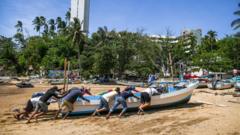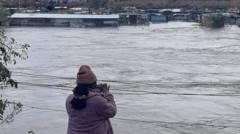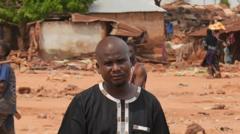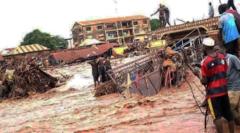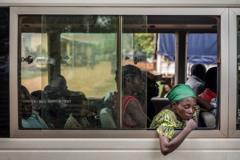At least 33 people have lost their lives due to severe flooding in Kinshasa, raising urgent concerns over the city’s infrastructure and climate adaptation efforts. The torrential rains, classified as some of the heaviest in sixty years, have overwhelmed the Congolese capital, which is home to approximately 17 million residents. With the Congo River at unprecedented levels, desperate attempts to escape the unpredictable floodwaters have become a grim reality; many residents are forced to swim, wade, or use makeshift canoes for safety.
Dozens Dead as Floods Devastate Kinshasa Amid Climate Crisis

Dozens Dead as Floods Devastate Kinshasa Amid Climate Crisis
Torrential rains in the Democratic Republic of Congo’s capital have caused widespread devastation, leaving many residents in peril.
According to local officials, flooding has predominantly affected the poorest neighborhoods on the city’s outskirts, resulting in the destruction of numerous homes. The mayor of Kinshasa reported that about half of the 26 districts in the city have been impacted, with search and rescue operations underway. Local accounts indicate that some areas, such as Ndanu and N'djili, have seen water levels rise up to 1.5 meters, leaving many residents trapped.
Residents have expressed their frustration regarding the governmental response, asserting that authorities have been slow to act and have not provided sufficient assistance. Combined with escalating water shortages caused by damaged treatment plants, the situation remains dire for thousands. Furthermore, recent studies underscore systemic issues in Kinshasa, including inadequate sewage management and urban planning, exacerbating the impact of climate-related disasters.
Deputy President Jacquemain Shabani acknowledged that the N'djili River has breached its banks and is heavily polluted, highlighting the public health risks presented by such overflowing waters. While additional heavy rains are anticipated in northern and northeastern regions of the DRC, the nation grapples with pressing questions about preparedness for future climatic challenges.
The tragedy unfolding in Kinshasa serves as a stark reminder of the vulnerabilities faced by urban populations amidst worsening climate conditions and calls for urgent action in addressing long-standing infrastructural deficiencies.
Residents have expressed their frustration regarding the governmental response, asserting that authorities have been slow to act and have not provided sufficient assistance. Combined with escalating water shortages caused by damaged treatment plants, the situation remains dire for thousands. Furthermore, recent studies underscore systemic issues in Kinshasa, including inadequate sewage management and urban planning, exacerbating the impact of climate-related disasters.
Deputy President Jacquemain Shabani acknowledged that the N'djili River has breached its banks and is heavily polluted, highlighting the public health risks presented by such overflowing waters. While additional heavy rains are anticipated in northern and northeastern regions of the DRC, the nation grapples with pressing questions about preparedness for future climatic challenges.
The tragedy unfolding in Kinshasa serves as a stark reminder of the vulnerabilities faced by urban populations amidst worsening climate conditions and calls for urgent action in addressing long-standing infrastructural deficiencies.




